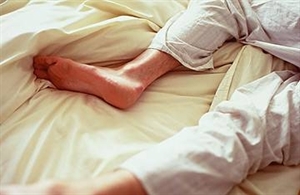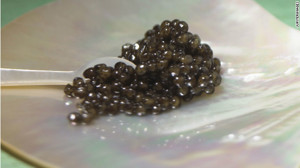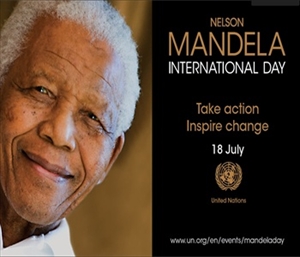International Mandela Day 2024 is on Thursday, July 18, 2024: What are some examples of creativity that Nelson Mandela has shown throughout his work?
Thursday, July 18, 2024 is International Mandela Day 2024. Nelson Mandela International Day, July 18, For Freedom, Justice ... Every year, on Mandela Day,
As an Amazon Associate I earn from qualifying purchases.
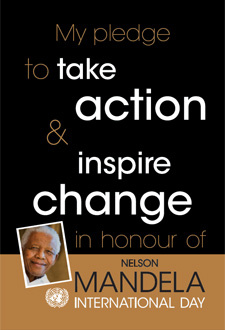
-The former political prisoner who led South Africa beyond apartheid remains a figure of undiminished global renown. But what of the revisionist case which highlights his flaws? On Nelson Mandela's 90th birthday, Tom Lodge assesses how far the record of his political career and judgment sustains his reputation
(This article was first published on 18 July 2008)
On the whole, the public celebrations that accompany elderly politicians' birthdays are not voluntary. If they are still in power it is not by popular choice and if they are retired their anniversaries are private affairs. Nelson Mandela must surely be the first public figure whose 90th birthday on 18 July 2008 was anticipated with an internationally televised rock concert held in a packed public space in London. The audience on 27 June included a fair share of people who were on average a decade or two older than the crowd that would camp out at Glastonbury the upcoming weekend, but among the statesmen, divas and television personalities there were plenty of fresh faces. It's a fair bet that many of the concert-goers in Hyde Park that day were still learning to stand when Nelson Mandela walked out of his prison cell. For them, the anti-apartheid struggle is a history lesson, something that happened in another country in another time. But the affection and admiration Mandela commands across such a vast and varied public following was very evident. How can we explain it?
Tom Lodge is professor of peace and conflict studies at the University of Limerick, Ireland. He was formerly professor of political studies at the University of the Witwatersrand, South Africa. He is the author of Mandela: A Critical Life (Oxford University Press, 2006). His previous books include Politics in South Africa: From Mandela to Mbeki (Indiana University Press, 2003)
The straightforward answer was the one that Stephen Fry supplied in his interview backstage in Hyde Park. Mandela is a good and great man; such people are rare; and they have an unusual capacity to inspire public optimism and social solidarity. This is all true but it can be only part of the explanation. It doesn't take much imagination to think of public figures with equivalent moral qualities that do not evoke such adulation. Vaclav Havel? Aung San Suu Kyi? It takes a bit more effort to identify public figures with comparably heroic careers, but they exist and indeed include many of Mandela's own compatriots.
The flaws on the icon
It won't be long before the first fully revisionist biographies of Mandela appear and they will emphasise his political shortcomings and moral lapses. Political critics are likely to focus on his early relationship with the South African Communist Party - which at least one influential authority, RW Johnson, thinks he actually joined - as well as (for example) the tactical and strategic errors that he made as the first commander of the African National Congress (ANC's) armed wing, Umkhonto we Sizwe, and his disregard for the most elementary considerations of security.
Those with shorter historical memories might focus on the inconsistencies in Mandela's foreign policy, an area of government in which he assumed a decisive role, promoting a human-rights programme in Africa while be-medalling the Indonesian dictator Suharto for his donations to the ANC. It was Suharto, incidently, who gave Mandela the first of the comfortable tunic-like shirts that are now the distinctive attribute of the "Madiba" sartorial style.
Revisionist critics will also make mileage from Mandela's private life. Mandela's marriage to Winnie was such an important romantic ingredient of his international appeal. Winnie Mandela's own autobiographical writings, Part of My Soul (1985), preceded Mandela's Long Walk to Freedom (1994) as a global bestseller. Yet Mandela's loyalty to Winnie represented (as Elleke Boehmer notes in her superb Nelson Mandela: A Very Short Introduction) "a major moral blind spot"; and it was a blindness with significant public consequences, given his insistence on appointing her to important positions within his party and government which she all too predictably abused.
Also in openDemocracy
Gillian Slovo, "Making history: South Africa's Truth and Reconciliation Commission" (5 December 2002)
John Matshikiza, "Johannesburg: shanty city, instant city" (13 December 2002)
Paul Kingsnorth, "Apartheid: the sequel" (20 May 2003)
Nahla Valji, "South Africa: no justice without reparation" (2 July 2003)
Achille Mbembe, "South Africa's second coming: the Nongqawuse syndrome" (15 June 2006)
Achille Mbembe, "Whiteness without apartheid: the limits of racial freedom" (4 July 2007)Roger Southall, "South African lessons for Kenya" (8 January 2008)
Roger Southall, "South Africa and Zimbabwe: the end of ‘quiet diplomacy'?" (29 April 2008)
Faten Aggad & Elizabeth Sidiropoulos, "South Africa's tipping-point" (2 June 2008) on South African politics and
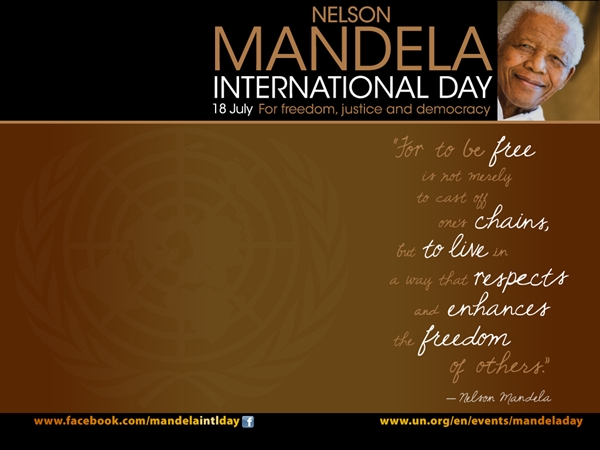
Why did Nelson Mandela go to prison?
Nelson Mandela was one of the founding leaders of a political group known as the African National Congress. He was devoted to peaceful demonstrations, but eventually turned to violence. The ANC and MK (Guerrilla forces) planned to sabotage key strategic locations and civilian buildings in their "fight for freedom". Basically Mandela can be defined as a modern-day terrorist. In fact, Margaret Thatcher the British Prime Minister, issued this statement during 1987. "The ANC is a typical terrorist organisation. Anyone who thinks they will rule South Africa is living in cloud-cuckoo land". So, Nelson was convicted of treason (trying to derail the government), and he was sentenced to life imprisonment.
When he was released in 1990, he rallied support for black African rights, privileges and better opportunities. He believed in racial equality and a unified nation with laws that benefited everyone. Discussions began with the white Prime Minister F.W De Klerk about how the Apartheid situation could be rectified. Rebellion and international pressure forced change - Mandela being the "historical figure" who encouraged this alteration of society. In the end, he became the first black South-African Prime Minister in 1992. He introduced new rules which allowed blacks to be respected. However, many of his policies failed to lift the economy and caused extensive damage to South-African lifestyle. He arguably did more bad than good, but many people don't know the history that encompasses the aftermath of the election.
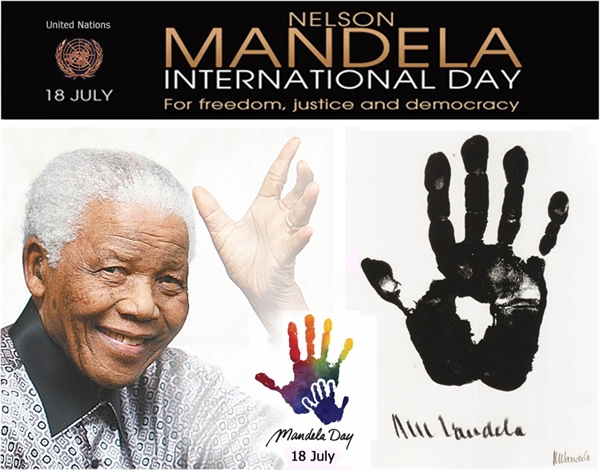
How was Nelson Mandela's involvement in the banning of the Apartheid?
As a young student, Mandela became involved in political opposition to the white minority government's denial of political, social and economic rights to South Africa's black majority. Joining the African National Congress in 1942, he founded its more dynamic Youth League two years later together with Walter Sisulu, Oliver Tambo and others.
After the 1948 election victory of the Afrikaner-dominated National Party with its apartheid policy of racial segregation, Mandela was prominent in the ANC's 1952 Defiance Campaign and the 1955 Congress of the People, whose adoption of the Freedom Charter provided the fundamental program of the anti-apartheid cause. During this time Mandela and fellow lawyer Oliver Tambo operated the law firm of Mandela and Tambo, providing free or low-cost legal counsel to many blacks who would have been otherwise entirely without legal representation.
Initially committed to non-violent mass struggle he and 150 others were arrested on 5 December 1956 and charged with treason. The marathon Treason Trial of 1956-1961 followed, and all were acquitted. Mandela and his colleagues accepted the case for armed action after the shooting of unarmed protesters at Sharpeville in March 1960 and the subsequent banning of the ANC and other anti-apartheid groups.
In 1961 he became the commander of the ANC's armed wing Umkhonto we Sizwe ("Spear of the Nation", or MK), which he co-founded. He coordinated a sabotage campaign against military, government and civilian targets and made plans for possible guerrilla war if sabotage failed to end apartheid. He also fundraised for MK abroad, and arranged for paramilitary training, visiting various African governments.
On August 5, 1962 he was arrested after the CIA tipped off the police, after living on the run for seventeen months and was imprisoned in the Johannesburg Fort. Three days later the charges of leading workers to strike in 1961 and leaving the county illegally were read to him during a court appearance. On October 25, 1962, Mandela was sentenced to five years in prison. Two years later on June 11, 1964 a verdict had been reached concerning his previous engagement in the African National Congress.
While Mandela was in prison, police arrested prominent ANC leaders on 11 July 1963 at Liliesleaf Farm, Rivonia. Mandela was brought in, and at the Rivonia Trial, Mandela, Ahmed Kathrada, Walter Sisulu, Govan Mbeki, Andrew Mlangeni, Raymond Mhlaba, Elias Motsoaled, Walter Mkwayi (escaped during trial), Arthur Goldreich (escaped from prison before trial), Dennis Goldberg and Lionel "Rusty" Bernstein were charged with sabotage and crimes equivalent to treason (but which were easier for the government to prove). Joel Joffe, Arthur Chaskalson and George Bizos were part of the defence team that represented the accused. All except Rusty Bernstein were found guilty and sentenced to life imprisonment on 12 June, 1964. Charges included involvement in planning armed action, in particular sabotage (which Mandela admits to) and a conspiracy to help other countries invade South Africa (which Mandela denies). Over the course of the next twenty-six years, Mandela became increasingly associated with opposition to apartheid to the point where the slogan "Free Nelson Mandela" became the rallying cry for all anti-apartheid campaigners around the world.
While in prison, Mandela was able to send a statement to the ANC who in turn published it on 10 June, 1980 which said in part:
'Unite! Mobilise! Fight on! Between the anvil of united mass action and the hammer of the armed struggle we shall crush apartheid!'[
Refusing an offer of conditional release in return for renouncing armed struggle (February 1985), Mandela remained in prison until February 1990, when sustained ANC campaigning and international pressure led to his release on 11 February, on the orders of state president F.W. de Klerk and the ending of the ban on the ANC. He and de Klerk shared the Nobel Peace Prize in 1993. Mandela had already been awarded the Sakharov Prize for Freedom of Thought in 1988.
As president of the ANC (July 1991 - December 1997) he ran a largely ceremonial and uncompetitive campaign against de Klerk for the new office of President of South Africa. Mandela won, becoming the nation's first black Head of State. De Klerk was appointed deputy president.
As president, (May 1994 - June 1999), Mandela presided over the transition from minority rule and apartheid, winning international respect for his advocacy of national and international reconciliation. Some radicals were disappointed with the social achievements of his term of office, however, particularly the government's ineffectiveness in stemming the AIDS crisis.









